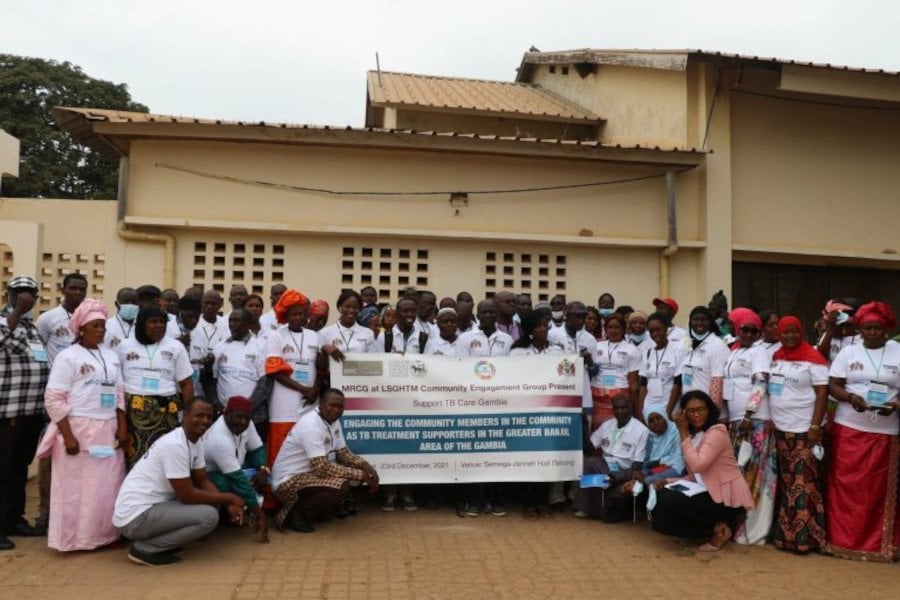
The TB Sequel Project team at the Medical Research Council Unit The Gambia at the London School of Hygiene & Tropical Medicine (MRCG at LSHTM) in collaboration with the National Leprosy and Tuberculosis Control Program (NLTP) convened a 3-day workshop for household heads and homeowners at the Semega Janneh Hall in Tallinding from 21st to 23rd December 2021.
The engagement targeted more than 50 participants from the Greater Banjul Area in The Gambia. Funded by the LSHTM Public Engagement Small Grant Scheme- Continued Development Grant, the workshop aimed at engaging the homeowners and household heads as treatment supporters in their communities.
Dr Olumuyiwa Owolabi, lead clinician of the TB sequel project at the MRCG at LSHTM spoke about the significance of having community members, homeowners and household heads to support this initiative.
He said, “There is still a lot of unresolved stigma in our communities and TB patients need a lot of support. Sensitising the homeowners and household heads who rent out their houses and building their understanding of this disease and of the support that TB patients require, will help reduce the stigma. This will make it easy for TB patients to disclose their status without the fear of being stigmatised.”
Fatou Jarjue, President of Ex TB Gambia in the West Coast Region said, “Psychosocial support is important in addressing the many linked complexities of TB. Such support will ultimately contribute to improving TB treatment outcomes, as it helps to keep the patients on adequate treatment through improved adherence. Family members, civil society and non-governmental organisations and community members are key conductors of psychosocial support.”
She added that her organisation is committed to providing TB patients with psychological support such as counselling sessions or peer-group support, and material support that addresses the indirect costs incurred by patients in accessing health services.
Kebba Sambou, Leprosy TB Officer at the National Leprosy and Tuberculosis Control Program said that the MRCG at LSHTM plays a vital role in the fight to eradicate TB through awareness-raising programs, training healthcare professionals on TB diagnostics and the systematic screening of high-risk and vulnerable populations with presumed TB cases.
Over the years, the MRCG at LSHTM has maintained the TB research platform through core funding and a programme grant focused on children with TB through a family-centred approach, with the aim to eliminate TB and to understand how the disease is transmitted within communities, as well as how the diagnosis, treatment and control measures could be improved.
As part of the engagement, the participants toured the direct TB observation centres within the Greater Banjul Area, the NLTP and the MRCG at LSHTM TB facilities to gain a better understanding of the systems and the research activities.
The MRCG at LSHTM’s TB research platform has worked with collaborators within and outside The Gambia, including a strong partnership with the Ministry of Health through the National Leprosy and Tuberculosis Control Program. This partnership has been key to many research outputs that have fed into the system to benefit TB control in the country.
Participants were awarded certificates of appreciation in recognition of their support in the fight against TB.
Our postgraduate taught courses provide health practitioners, clinicians, policy-makers, scientists and recent graduates with a world-class qualification in public and global health.
If you are coming to LSHTM to study a distance learning programme (PG Cert, PG Dip, MSc or individual modules) starting in 2024, you may be eligible for a 5% discount on your tuition fees.
These fee reduction schemes are available for a limited time only.
